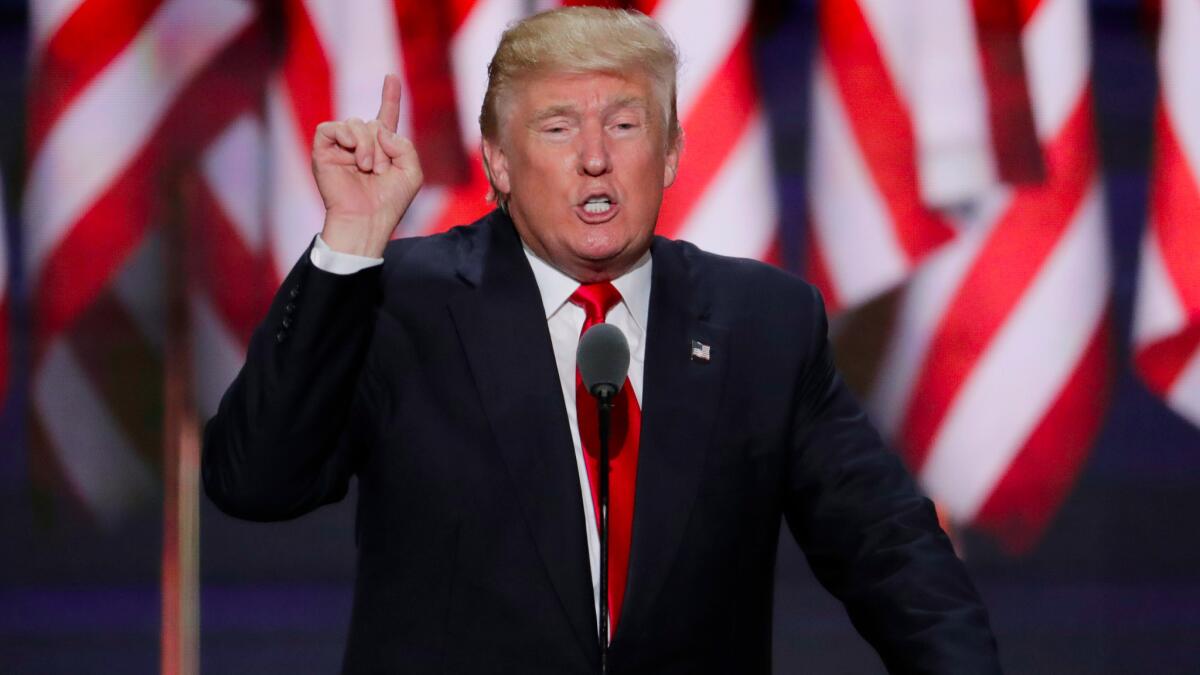Editorial: Donald Trump plays the fear card at the Republican convention

- Share via
Donald J. Trump accepted the Republican presidential nomination Thursday evening with a speech that was frightening in more ways than one.
Trump’s overarching intention was to sow fear in America’s voters: Fear of uncontrolled crime and terrorism that “threaten our very way of life.” Fear of immigrants, including refugees from the civil war in Syria. Fear of Muslims, although instead of the “total and complete shutdown of Muslims entering the United States” he proposed last year, Trump said he would suspend immigration from countries that have been “compromised by terrorism.” Fear of foreign trading partners that, thanks to “disastrous trade deals supported by Bill and Hillary Clinton,” have destroyed American manufacturing.
Finally, Trump warned that Americans should fear Hillary Clinton, whom he described as a corrupt politician whose legacy as secretary of State amounted to “death, destruction and weakness.”
But Trump’s speech was frightening in a second sense: By softening his strident rhetoric, by (selectively) citing statistics, by couching cruel policies in the language of compassion, Trump managed to make an extreme agenda sound not only plausible but necessary.
This seemingly more restrained Trump said that he wakes up every day “determined to deliver for the people I have met all across this nation that have been neglected, ignored and abandoned.” He spoke with feeling about victims of crime, impoverished Latinos and African-Americans, and the LGBTQ community, which was victimized by the recent attack on a nightclub in Orlando, Fla. All Americans, he suggested, would benefit from a Trump administration that would restore law and order and “add millions of new jobs and trillions in new wealth that can be used to rebuild America.”
Even in his attacks on Clinton, he moderated his tone and elevated his vocabulary. He dropped the reference to “Crooked Hillary,” and when some in the crowd shouted “Lock her up,” he countered: “Let’s defeat her in November.” The underlying slander, however, was the same. Notwithstanding the FBI’s conclusion that Clinton’s use of a private email server to transmit classified material was extremely careless and negligent but not worthy of criminal prosecution, Trump claimed to know better: “These terms are minor compared to what she actually did. They were just used to save her from facing justice for her terrible crimes.”
Trump’s speech was frightening in a second sense: He managed to make an extreme agenda sound not only plausible but necessary.
In the hours and days ahead, fact-checkers will dissect Trump’s speech and call attention to omissions, oversimplifications and distortions. For example, although the murder rate has jumped in some cities in the last year, long-term trends show that homicide in urban areas has been declining. And the loss of manufacturing jobs in this country is the result of myriad factors (including automation), not just free-trade agreements.
If Trump’s dire diagnosis of the country’s problems was deceptive, so were his proposed solutions. For example, he promised that “the crime and violence that today afflicts our nation will soon come to an end,” adding, “Beginning on January 20th 2017, safety will be restored.” But how? Trump said he would “work with, and appoint, the best and brightest prosecutors and law enforcement officials in the country to get the job done.” But most prosecutors and law enforcement officers are local, and the federal government plays little or no role in their daily work.
When Trump fleetingly addressed foreign policy in his speech, he said he would replace “globalism” with “Americanism” — whatever that means. One interpretation, suggested by Trump’s recent interview with the New York Times, is that a Trump administration would be willing abandon NATO allies if they didn’t spend enough on their own defense. In his speech, Trump warned that “the countries that we protect, at a massive loss, will pay their fair share.”
Other assertions in Trump’s speech will be subjected to similar scrutiny, but many of those who watched it on television will never catch up with the corrections. They will remember that they saw a nominee who spoke in somber tones and seemed resolute about rescuing America from a nightmare of crime, terrorism and economic stagnation. Never mind that Trump still lacks an elementary grasp of domestic and foreign affairs, that he still wants to build a wall on the Mexican border and withdraw the U.S. from engagement with the world, and that he still has no words of comfort for victims of police brutality.
The challenge for Hillary Clinton is to rescue reality from the illusion Trump created in this perversely powerful speech.
Follow the Opinion section on Twitter @latimesopinion and Facebook
ALSO
Trump’s 45% tariff on Chinese goods is perfectly calculated
The toxic politics of ‘Lock her up!’
Trump says he stands for ‘America First.’ What does that mean?
More to Read
A cure for the common opinion
Get thought-provoking perspectives with our weekly newsletter.
You may occasionally receive promotional content from the Los Angeles Times.










